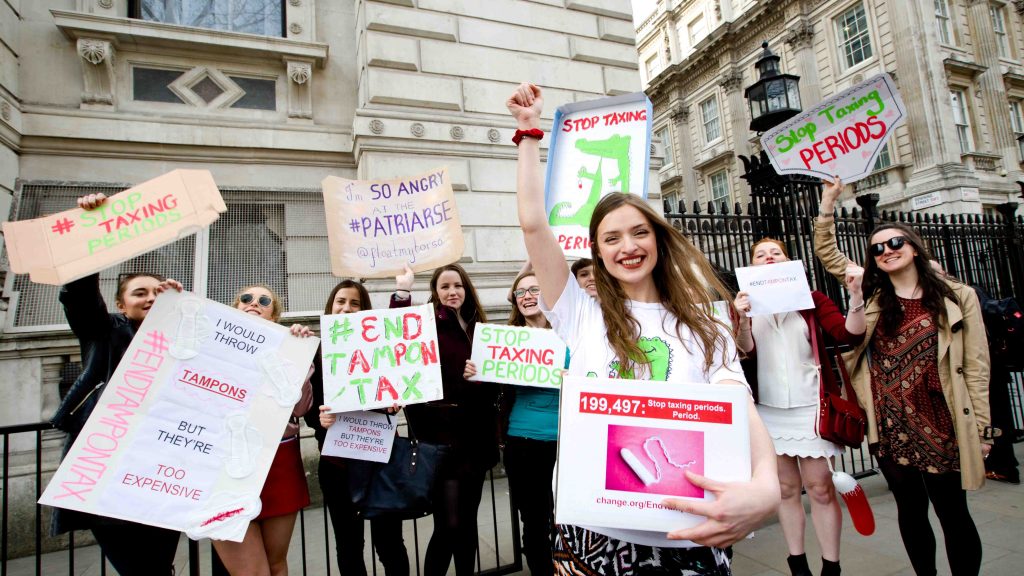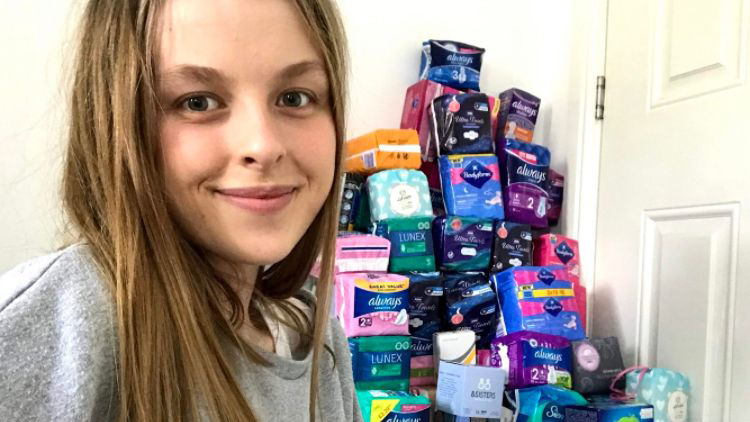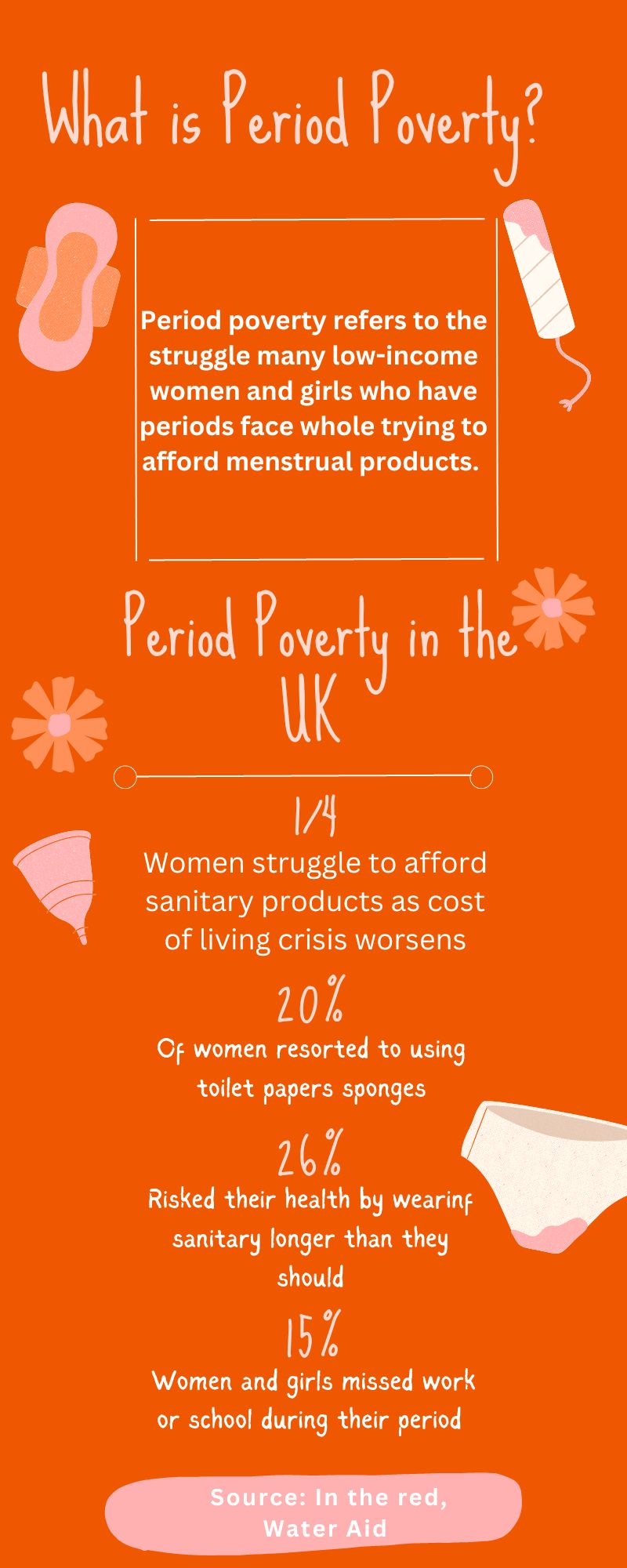As the Welsh government unveils its ‘Period Proud Wales’, action plan, campaigners say menstrual products have become less accessible.

It was 2014 when an online article prompted Laura Coryton to start a petition against a tax on tampons aiming to make menstrual products more accessible and she was elated when the tax was finally axed after two years of her campaign. Yet, almost 10 years after her campaign started, Laura fears that accessibility to menstrual products across the United Kingdom is worse.
“A lot of organisations that look in the alternatives people have when they need to choose between food and periods have heard of people resorting to newspapers and used socks,” said Laura.
“This obviously poses huge health implications and risks and it’s quite invisible as well because you can’t tell when someone’s doing that and they’re not likely to share it with you because it’s embarrassing.”
Molly Fenton, Co-Founder of the Love Your Period Campaign, said that the cost of living crisis has pushed more people into period poverty.
“We see a rise of people not being able to have products now that before Covid or during Covid were able to access products,” said Molly Fenton, Co-Founder of the Love Your Period campaign.
“It’s kind of like a new territory for them not understanding what this poverty, when it comes to periods is like.”
A September 2022 survey, estimated that one in eight women and people having periods would struggle to afford sanitary products this year.
“The most shocking story I had was of a year 11 pupil who had only recently been unable to afford products since this academic year, and she’d go to school, use one dirty sock overnight and would then use the second dirty sock from the previous day,” said Molly. “That’s really dangerous. I asked her if she knew that there are free products in school while bearing in mind they’ve been in since 2019, and she didn’t because the school hadn’t advertised it.”

The Welsh Government announced Period Proud Wales Action Plan which outlines its plans to end period poverty over the next five years and has already spent over £ 13 million towards ending period poverty since 2018.
However, campaigners are worried that pupils in schools are not aware that they can avails period products free of cost in their schools.
Laura said, “Theoretically, all state schools are able to order free period products at zero cost through the government, but we still find in a lot of schools that they don’t distribute them to kids, very effectively.”
“One school that we visited, had a system where kids had to come to reception and write their name to sign out products, which obviously they’re not really going to do if they’re embarrassed about it in the first place,” said Laura. “So they technically did have free period products, but no one was using them.”
Molly explained further that in a survey conducted by Love Your Period amongst 3000 pupils in Cardiff, there wasn’t a single student who knew that reusable sanitary products were available in their schools.
She said, “Pupils need to know what these products actually are. We find in many schools that these products are stored in a cupboard and when we visit months later and they’re still wrapped up in that cupboard.”

Laura Coryton believes that even though the Tampox Tax had been taken down in 2016, retailers still drive up a huge profit by keeping the prices high.
“Manufacturers of period products have dropped their prices in line with tampon tax ending, but the retailers haven’t,” said Laura. “So they’ve been able to buy these products for less and then sell them for more.”
Laura has now launched a new petition asking for a major retailer to reduce the price of its menstrual products amid concerns that axing the period tax is not enough to increase the affordability of sanitary products.
Molly said, “If we look at where we are now, it’s almost like it never went. The government announced that a lot of money would be going to different charities across the UK and this was supposed to be a celebration. It was kind of like it was the end but really, did anyone see this money come up?”
“And because of inflation, these prices now are ridiculous. We’re at a point where we don’t buy products in our house,” she says. “We are lucky that we’ve never had an issue with period poverty, but we, we just can’t afford them.”
Molly believes that UK lawmakers lack the proper knowledge of the ground scenario with regard to period poverty.
“I think they’ve got the statistics, but that’s it. Realistically, if we put a survey in front of young people and ask them about period poverty, what are they going to say?” said Molly. “Wouldn’t stigma make them feel like they can’t put that in because it’s embarrassing?”
“We know realistically that a survey doesn’t really paint the picture and those politicians only having that and those who are making these policies and laws and legislations don’t necessarily have the photo of what’s really going on.”
Whereas, Laura believes that the lawmakers have all the tools they need to end period poverty but lack the will to do so.
“I think they definitely can and if you look at other countries like Scotland for example, then you see that lawmakers not just can deal with it, but have started to really deal with it through policy,” she said.
“It’s just that our lawmakers don’t want to at the moment, which is very frustrating, and I think they’re kind of using period stigma to justify that since they don’t really have to talk about it because people still find it difficult to talk about.”
